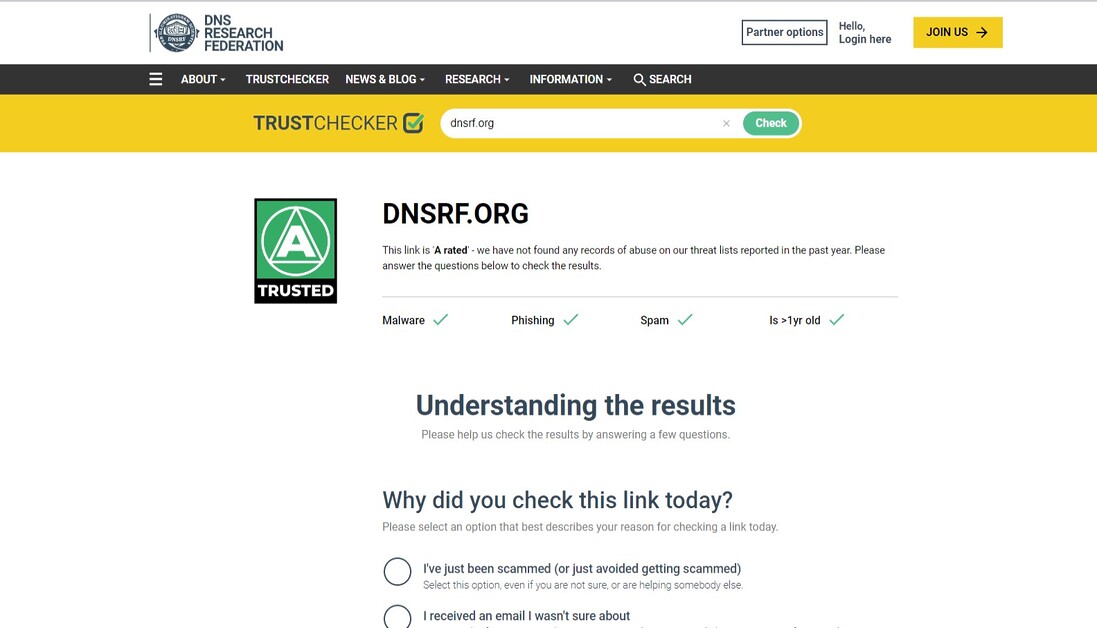Trust Checker is a new free-to-use link validity tool to fight online scammers.
Most of us have received one – a text alert or email from a car hire brand, an airline, a retailer or accommodation brand that includes a familiar brand name that looks a little suspicious. It’s become an everyday feature of managing all aspects of our holidays and travel online. In Britain today, the average person now receives around 240 scam emails or texts a year, with one in eight receiving double this.
To help tackle this, and a first for the travel sector – a new free to use tool is being launched next month, which will benefit all holidaymakers at home and abroad. It is something called Trust Checker, and it’s the brainchild of Oxford-based research group, the DNS Research Federation

Emily Taylor, CEO of DNS Research Federation explains: “In the fight against online crime, part of our mission is to make sense of the internet; to gather and analyse threat intelligence and publish research that helps businesses and policymakers to tackle online crime. One thing that we was felt was missing was something simple, practical and universally available to all consumers. Trust Checker is a new tool that allows holidaymakers to check the validity of links they may receive via text or email.
So if you get a message that you think that looks a bit dodgy – whether it be from an airline, car hire brand or hotel group – put the link into the Trust Checker, and it will give you an instant A, B, C, score. It’s a simple tool and in years to come it will help people traveling abroad – those hiring cars, booking accommodation, and looking for flight details. In a world where everyone’s lives are dominated by emails and text messages – confirming bookings, payments and deliveries – Trust Checker can help give travellers some comfort that there’s no nasty financial surprises lurking in their phone messages that might ruin a holiday.”
Emily adds: “The launch of Trust Checker comes at a time when the prevalence and impact of online scams is at a record high. Our own consumer polling reveals that the average amount of money British adults lose to online scams has hit a national average of £1,169 per person, with 7% claiming to have lost more than £7,500 to scammers.
Furthermore, major brands from travel and other sectors are having their brands infringed by the scammers, who rely on using familiar brand names to attract their victims. Here our polling presented a concerning picture of UK brands being weaponised on an industrial scale, with 97% of consumers naming one or more brands that had appeared in the attempted scams they had received on their phones.”
Trust Checker helps the consumer, but it’s part of a much bigger project that the team at Oxford-based DNS Research Federation have been working on for the last 12-months. The enormous data set behind Trust Checker presents deep insight for travel companies, assessing the extent to which their brands are being systematically infringed by the online scammers.

Lucien Taylor, Chief Strategy Officer at DNS Research Federation comments: “At the moment, we are analysing in real-time global intelligence feeds from 93 sources. It’s a huge amount of data on online abuse and over the last year we have been dividing all of that data into sectors and looking at the prevalence of brands in threat feeds and online attacks. For the travel and tourism, the sector currently ranks mid-table, 9th of 17 sectors analysed.
Currently, we are reporting 902 abuse reports in the ’Travel and Holidays’ sector in the past 365 days – these attack URLs (links) that are typically presented to users in texts and messages inviting them to follow the link and visit a fake website. Attack links can be used to target many victims and we are looking into better reporting to determine the number of victims per attack site. According to our data, scammers are targeting the travel sector at an average of 26 fake websites per brand.
“From our figures for the sector, there are many familiar big brand names from hotels and accommodation brands to airlines and travel fashion that are common targets for the scammer. These travel brands are all appearing in our threat and abuse reports, meaning that there are links which are in themselves, mini factories for scam. This is where a scammer has built a website, developed a link which impersonates the brand.
“A simple fact with online crime – scammers like to leverage big brands. People, when they go on holiday, they get assurance from choosing big brands but when you assume you’re going for a safe, trusted brand, it may not be the case.”
Taylor cites DIY holidays as “posing a heightened risk for travellers. In situations where people are booking all the components of a holiday separately – the holiday, the flight, the car rental – it’s increasing the number of text messages and confirmations they’re getting. This can leave consumers more vulnerable to falling for a scam on their phone.”

Why are holidays being targeted by scammers? Lucien Taylor adds: “Holidays are a time when we’re excited, but we’re also a little bit disorientated. We might be off-guard. We might be in a place with a native language we don’t speak, in a time zone we’re not comfortable with – and there may be a currency we don’t fully understand. So there’s lots of opportunities for scammers to pounce on people’s disorientation.”
“The solution requires everyone to get involved. Brands need to work together and they need to share threat data. Scammers work together, they share and they move quickly. The days are long-gone when individual brands can tackle online crime alone.”
“As part of our work, we participate in – and speak at – the world’s leading industry events and conferences. We meet a lot of people from banks. We meet a lot of internet service providers. We meet the big platforms and law enforcement agencies of course. Travel brands need to be more visible at these gatherings, because the clock is ticking. We all need to work together for the sake of the consumer and the future of a free and open Internet.”
Tell me moe more about Trust Checker
Please visit DNS Research Federation to find out more and learn what the Federation is doing. Click here to use Trust Checker






